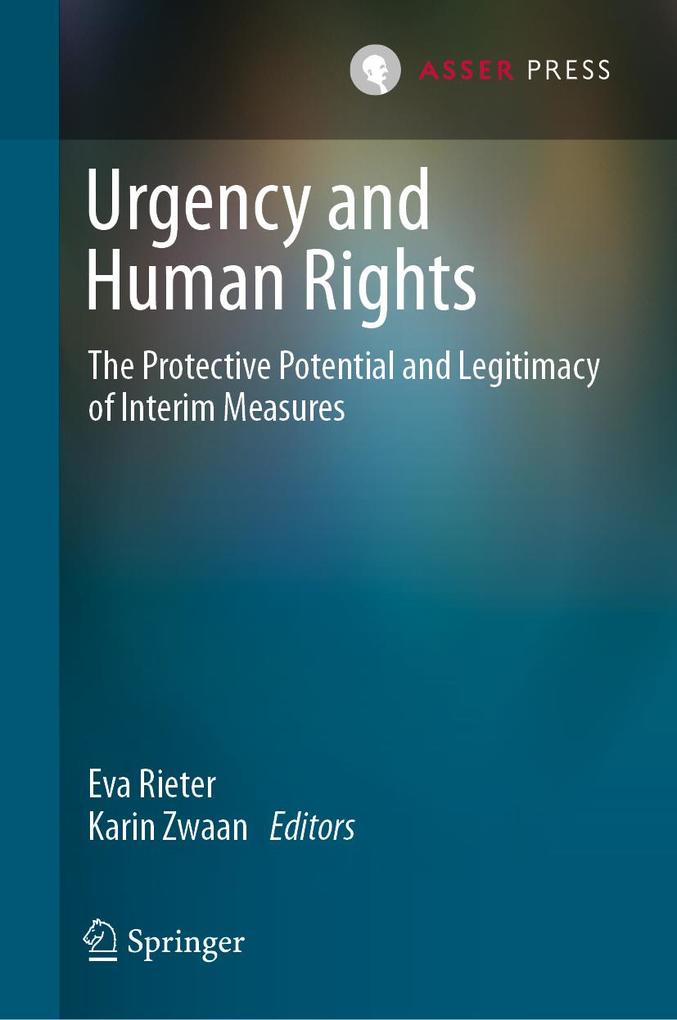
Sofort lieferbar (Download)
This book deals with urgency and human rights. 'Urgent' is a word often used, in very different contexts. Yet together with a reference to human rights violations, it likely triggers images of people caught up in armed conflict, facing terror from either the state, gangs, paramilitaries, or terrorists. Or of people fleeing terror and facing walls, fences or seas, at risk of being returned to terror, or ignored, neglected, abused, deprived of access to justice and basic facilities, facing death, torture and cruel treatment. Here these both ongoing and expected violations are explored in the context of (quasi-)judicial proceedings as international tribunals and domestic courts are increasingly called upon to order interim measures or accelerate proceedings in such cases.
This edited volume concerns the protective potential of interim measures in international human rights cases and the legitimacy of their use and discusses obstacles to their persuasiveuse, to clarify how their legitimacy and protective potential could be enhanced in the context of concrete legal cases. Examining this is especially pressing when courts and quasi-judicial bodies have used interim measures in response to requests by individuals and organisations in the context of issues that are unpopular with governments and/or controversial within society, which has led states to at times employ political pressure to limit their use.
Urgency and human rights are discussed from the vantage point of various practitioners and scholars, with the aim of identifying how interim measures could be legitimate and protective and to single out obstacles to their implementation. Drawing from practices developed in various international and regional adjudicatory systems, the contributors provide their perspectives on the legitimacy and/or the protective potential of interim measures and other (quasi-)judicial proceedings in urgent human rights cases.
There is considerable discussion about how interim measures can be legitimate and well-functioning tools to address urgent human rights cases, this book aims to contribute to the ongoing discussion in this respect.
Dr. Eva Rieter is senior researcher and lecturer public international law and human rights law at the Centre for State and Law, Radboud University, Nijmegen, The Netherlands. Dr. Karin Zwaan is associate professor in the Department of Migration Law at the Centre for State and Law, Radboud University, Nijmegen, The Netherlands.
This edited volume concerns the protective potential of interim measures in international human rights cases and the legitimacy of their use and discusses obstacles to their persuasiveuse, to clarify how their legitimacy and protective potential could be enhanced in the context of concrete legal cases. Examining this is especially pressing when courts and quasi-judicial bodies have used interim measures in response to requests by individuals and organisations in the context of issues that are unpopular with governments and/or controversial within society, which has led states to at times employ political pressure to limit their use.
Urgency and human rights are discussed from the vantage point of various practitioners and scholars, with the aim of identifying how interim measures could be legitimate and protective and to single out obstacles to their implementation. Drawing from practices developed in various international and regional adjudicatory systems, the contributors provide their perspectives on the legitimacy and/or the protective potential of interim measures and other (quasi-)judicial proceedings in urgent human rights cases.
There is considerable discussion about how interim measures can be legitimate and well-functioning tools to address urgent human rights cases, this book aims to contribute to the ongoing discussion in this respect.
Dr. Eva Rieter is senior researcher and lecturer public international law and human rights law at the Centre for State and Law, Radboud University, Nijmegen, The Netherlands. Dr. Karin Zwaan is associate professor in the Department of Migration Law at the Centre for State and Law, Radboud University, Nijmegen, The Netherlands.
Inhaltsverzeichnis
Chapter 1. Introduction: Perspectives on the Protective Potential of Interim Measures in Human Rights Cases and the Legitimacy of their Use.- Chapter 2. Urgency and Human Rights: The Necessary and Legitimate Role of Regional Human Rights Tribunals.- Chapter 3. Urgency and Human Rights in EU Law: Procedures before the Court of Justice of the EU.- Chapter 4. The Politics of Interim Measures in International Human Rights Law.- Chapter 5. Provisional Measures in the African Human Rights System: Lingering Questions of Legitimacy.- Chapter 6. The Legitimacy of Interim Measures from the Perspective of a State: The Example of Canada.- Chapter 7. Urgency in Expulsion Cases before the European Court of Human Rights and the UN Committees: A Bird s Eye View.- Chapter 8. Irreparable Harm in the Ukraine Conflict: Interim Measures and Supplementary Forms of Intervention.- Chapter 9. Urgency at the European Court of Human Rights: New Directions and Future Prospects for the Interim Measures Mechanism?.- Chapter 10. The Innovative Potential of Provisional Measures Resolutions for Detainee Rights in Latin America through Dialogue between the Inter-American Court and Other Courts.- Chapter 11. Conclusion: The Protective Potential and Legitimate Use of Interim Measures in Human Rights Cases. Table of Cases.- Index.
Produktdetails
Erscheinungsdatum
21. November 2020
Sprache
englisch
Auflage
1st ed. 2021
Seitenanzahl
319
Dateigröße
4,49 MB
Herausgegeben von
Eva Rieter, Karin Zwaan
Verlag/Hersteller
Kopierschutz
mit Wasserzeichen versehen
Produktart
EBOOK
Dateiformat
PDF
ISBN
9789462654150
Entdecken Sie mehr
Bewertungen
0 Bewertungen
Es wurden noch keine Bewertungen abgegeben. Schreiben Sie die erste Bewertung zu "Urgency and Human Rights" und helfen Sie damit anderen bei der Kaufentscheidung.










